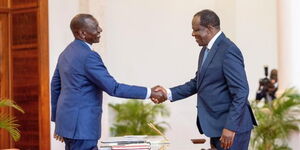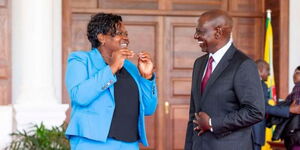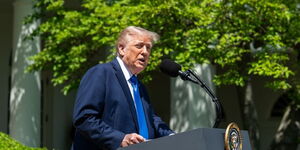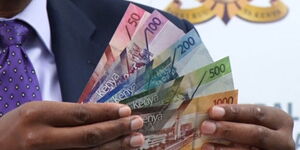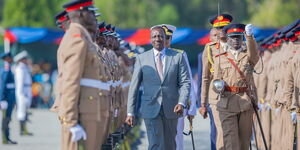President William Ruto on Wednesday, January 4, invited the media for a roundtable interview that will be televised live from State House, Nairobi.
According to a dispatch from Dominic Mugonyi, the head of the Presidential Communication Service, the President will field questions from media houses from 7:00 pm in an interview that will also be covered by international media houses.
However, ahead of the much-publicized interview just four months after his inauguration, Kenyans have taken to social media to lay out key issues that they expect the president to tackle in his first televised meeting with the press.
However, Kenyans took to social media to outline what they expected the president would address in his inaugural meeting with the press on Wednesday, January 4.
Unemployment
Anderson Kibet, a Kenyan on Twitter needed to know the president's plan on unemployment.
"What are his REAL plans of tackling unemployment affecting the Youth in Kenya?" he paused on his handle @kibtuin.
During the campaign period, President William Ruto promised to return to a stand-alone Youth ministry to cater to the needs of the youth if he is elected.
He also promised to make government credit accessible to the youth by removing red tape and bureaucracy that blocks them from getting it.
President Ruto also promised to establish start-up incubation centres across the country and facilitate employment and paid internship opportunities for the youth.
“If there is one thing that we must sort out in Kenya is the youth bulge and the unemployment that comes with it,” Ruto observed.
After their election into office, Ruto established the Hustler Fund, a scheme his government hoped would cure the issue of unemployment.
Healthcare
Tony Kilichu, another Kenyan on Twitter using the handle @TonniLishiaz, sought clarification on the state of health workers in the country.
“Is he aware that we have health workers who were appointed by PSC on Dec 2021 and they have not yet received their appointment letters up to date from the Ministry of Health (MOH)?
“How is he going to deal with the mega corruption in National Health Insurance Fund (NHIF) and improve its services for it to pull us and not push us away from it?” Kilichu paused.
During his coalition's manifesto launch, the President pledged to ensure that each Kenyan would only remit Ksh3,600 or Ksh 36,000 per household per year to NHIF.
He argued that the move aimed at shifting insurance from an individual and placing the same on a family or a household to maximise benefits and reduce burden.
“We recognise that at present, the NHIF falls considerably short. Kenya Kwanza is committed to implementing the reforms required so as to build this trust as recommended by stakeholders,” Ruto remarked.
Cost of Electricity
The price of buying an electricity token rose by 16.8 per cent in December 2022, at a time when households were battling the high cost of food prices.
In a screenshot shared online, it was revealed that Ksh2,000 was only able to get the user a total of 76.08 units.
According to the details in the screenshot, only Ksh958.63 was used to purchase the token while the balance of Ksh1,041.37 was taken up by taxes and other levies.
However, Ruto dismissed the talk of a hike in electricity bills revealing that there will be no additional charges for electricity adding that the government had already made the right decisions on ensuring that a predictable platform on how to run the economy.
“I want to allay the fears that are being spread by people that there will be an increase in electricity costs. I want to assure the country that there will be no additional charges today or going into the future on electricity bills to the people of Kenya,” he affirmed.
Data from Kenya Power and Lighting Company (KPLC) showed that a Ksh 2,000 token unit cost dropped to 76.08 in December from 91.47 in August.
Taxation
On the issue of taxation, Thomas Masinde going by the handle @tom_masinde needed to hear Ruto's plan in ensuring that Kenyans do not suffer from high taxation.
Kenyans have in recent times decried the high cost of doing business, especially for small-scale traders(hustlers) on increased levies on fuel.
Initially, the president indicated that every Kenyan above 18 years is issued with the Kenya Revenue Authority’s (KRA’s) pin, qualifying them as taxpayers.
Equally, the business community through the Kenya Association of Manufacturers (KAM) lamented the heavy taxation meted on them.
“It is becoming more expensive to operate in Kenya due to the introduction of taxes, fees, levies, and charges," he lamented," KAM Chairperson Mucai Kunyiha indicated adding that the tax measures instituted by the government were punitive.
Education
Parents have in recent times decried how expensive the Competency-Based Curriculum is, with some indicating that their children are on the verge of dropping out of school.
Mary Muthisya, a parent who has three children in the school, complained that the fees for the curriculum were expensive for her.
"My two younger children are expected to pay Ksh350 while their elder brother is expected to pay Ksh450 for CBC," she decried.
During the campaigns, Kenya Kwanza Coalition promised to review CBC.
Ruto noted that the Competency-Based Curriculum would need to be reviewed to accommodate concerns from parents, teachers as well as stakeholders in the Education sector.
It remains to be seen if the president will tackle these issues that seem to be pertinent and imperative to Kenyans when he faces the media.



